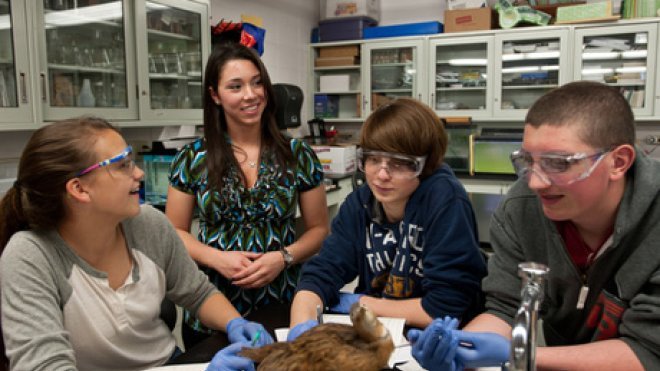Senior Spotlight: On a (NASA) Mission to Teach Science
NASA names Class of 2012 graduate Nicole Monaco one of five aspiring STEM educators to its prestigious Endeavor Fellowship

Bristol, R.I. – For an aspiring high school science teacher, what better way to amplify credentials in the ever-important STEM fields – science, technology, engineering and mathematics – than by studying the discoveries and initiatives undertaken by NASA in the last half century?
For Roger Williams University marine biology/secondary education major Nicole Monaco ’12, who will graduate with the Class of 2012 on May 19, that’s exactly what she will have the opportunity to do after earning an Endeavor Fellowship from NASA. By the time she completes the five-course online sequence, Monaco will emerge with a STEM certificate from Teacher’s College, Columbia University, and 50 credits that she can apply toward a master’s program at any school.
According to NASA, the highly competitive fellowship is a model for effectual improvements in teacher practice. Monaco is one of only 51 teachers – and just five pre-service teachers – to earn a 2012 Endeavor Fellowship.
“Endeavor offers educators research-based ways to bring relevant NASA and STEM discipline content to a school’s curriculum,” said Shelley Canright, manager of elementary, secondary and e-education at NASA headquarters in Washington, D.C. “The 2012 cohort of educators represents many of our nation’s future leaders in science, mathematics and technology education.”
Through the program, teachers engage with education experts, NASA scientists and with each other to carry back to the classroom a greater understanding of NASA discoveries that will impact student learning in real-world contexts and, hopefully, inspire the next generation of explorers, scientists, engineers and astronauts.
“We’re moving away from cookie-cutter formats where you tell the students what they need to know, and more toward inquiry-based learning that allows them to develop their own knowledge,” Monaco says. “I’m hoping to gain direct classroom knowledge that adds to my ability to do just that.”
Monaco is currently completing the program’s in-service teacher seminar and plans to take the first two courses this summer, following her graduation. She hopes to land a teaching position near her hometown of Carmel, N.Y., after she concludes her student teaching assignment at Mount Hope High School in Bristol, R.I.
Monaco says the Endeavor seminar experience has already illustrated the benefits of joining a network of colleagues across the country: “It’s really about building a community of STEM teachers,” she says. “It’s an exchange of ideas – how can we use science and technology to really build education?”
The project was designed and is administered by the U.S. Satellite Laboratory of Rye, N.Y. Funding for the program is provided through the NASA Endeavor Teacher Fellowship Trust Fund, in tribute to the dedicated crew of the space shuttle Challenger.
For additional information about the Endeavor Science Teaching Certificate Program, visit www.us-satellite.net/endeavor or www.nasa.gov/education.